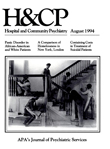Jail Recidivism and Receipt of Community Mental Health Services
Abstract
The authors' aim was to test the relationship between receipt of desired community mental health services by homeless mentally ill forensic clients and whether the clients returned to jail within six months.
Methods: Mentally ill homeless dients leaving jail were randomly assigned to three service conditions: intensive case management provided by an assertive community treatment team, intensive case management provided by individual case managers, and referral to a community mental health center. Data on whether clients' service needs were met were analyzed using discriminant function and chi square analyses.
Results: Thirty-two percent of the 105 clients interviewed at six months were reincarcerated during the six month study period. Jail recidivism was related to receipt of fewer services that clients reported they needed, specifically to receipt of fewer services for developing independent living skills. Service condition was not significantly related to return to jail.
Conclusions: Case management, a flexible community-based service that does not lend itself to clearly prescribed procedures, may easily deteriorate into providing monitoring rather than rehabilitative services for forensic clients and thus may facilitate reincarceration.
Access content
To read the fulltext, please use one of the options below to sign in or purchase access.- Personal login
- Institutional Login
- Sign in via OpenAthens
- Register for access
-
Please login/register if you wish to pair your device and check access availability.
Not a subscriber?
PsychiatryOnline subscription options offer access to the DSM-5 library, books, journals, CME, and patient resources. This all-in-one virtual library provides psychiatrists and mental health professionals with key resources for diagnosis, treatment, research, and professional development.
Need more help? PsychiatryOnline Customer Service may be reached by emailing [email protected] or by calling 800-368-5777 (in the U.S.) or 703-907-7322 (outside the U.S.).



